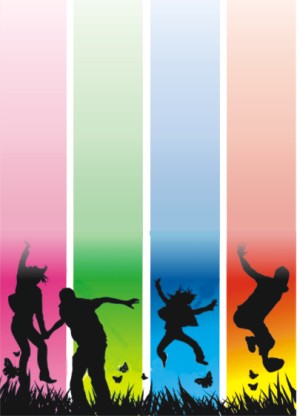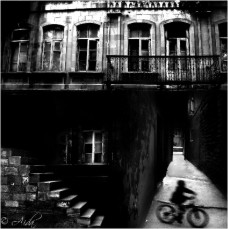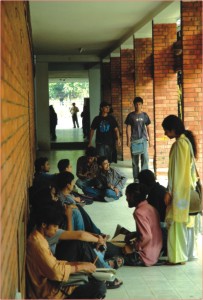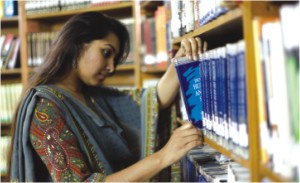| Spotlight
Missing Campus Life
Tanzina Rahman
The sharp squeaky noise was still buzzing in my ears. Dragging myself from bed, I looked at the table watch once again. The number that appeared 7:00am a minute ago when I turned the alarm off read 10: 30am! Yikes! I was fifteen minutes late for class. Cursing myself I rushed off to get dressed, shoved a toast in my mouth and was off to catch the bus which was about to leave. Once inside the glass doors of the bus that almost sliced me into half, I intended to search for a seat. But like always the bus was carrying hundreds of students standing back to back, trying to balance holding the handles. Securing a place beside the bus driver I fantasized about the wonderful life I would have right when I graduate. No pressure of heavy assignments, no rush to meet the deadlines, no need to prepare speeches for the nerve-racking presentations, no preparations for those stupid tests that hardly would do any good in my career and then - no waking up in the morning. Yes life after graduation would indeed be blissful. 
That is what I used to think during my years in university. But once I graduated things changed and I started to miss out the little escapades that I once enjoyed when I was in university. Perhaps this is the case of many others who miss campus life greatly. We become so engrossed counting out the negatives that we tend to forget the good things we get during this precious time of our lives. Simply hanging out with friends, going out for movies, bowling, skating and what not when classes get canceled, dozing off when the professor starts to give boring lectures, bunking classes of those teachers who rarely care about your attendance, having meals at the cafeterias while complaining about the awful taste of the food that you are having, working out late night on group projects, joining clubs and organizing campus events, going out with friends on annual trips and many more. It is a never-ending list, and each activity has its own share of fun. Of course one may say we can watch movies with friends in any period of our lives and complain about foods that do not taste good, but it is an undeniable fact that the inner joy you get from the companionship of campus life is not the same as any other.
Having completed my studies at a foreign university, I yearn for that chunk of life's happiness. Life was certainly different there. Adventures took place almost every day. In one such incident, my friend and I went out one weekend for a trip to Genting Highland. Well known for its casino and theme park, Genting seemed to be one of those ultimate getaway trips after the heavy load of assignments and late night works. We managed to get a beautiful seat in the coach and packed some snacks to munch on. Hopping from the bus as it arrived its destiny we immediately headed out for the casino. Even though I have seen casinos in movies, seeing it for the first time was some experience. Since money was an issue during student life (having our parents pay the outrageous tuition fee, we automatically developed the sense to count every penny we spent), we did not dwell on the games for long. After casino we rushed to fill in our empty stomachs. KFC stood out as the cheapest place to indulge in, and thus we finished our lunch and headed towards the theme park rides. The indoor theme park seemed less attractive than the outside ones. So we tried out almost all the roller coasters and puke stirring rides first. Later we checked out the bow and arrow game, being an amateur I was throwing the arrows all over the place, nevertheless it was a great experience. Of course this was not the scenario of everyday life during my undergrad, but I certainly managed to have fun in between the pressure of studies.
Few things which are a norm in student's life if they are studying abroad is to eat out almost every day (especially when you live in a dorm and since mom's homemade food is not available), or to prepare your own food - normally ramen or maggi noodles (or whichever brand of instant noodle is available in that country), accepting the fact that library is your second home (since more than half of your day you tend to spend time trying to find reference work or finish your group work), dozing off in cafeterias (students are actually seen more in cafeterias than in the classrooms!) and sharing almost everything (except for your undergarments) with your friends or roommates.
Just about a month ago, a friend of mine was chatting online and she was complaining that the quality of instant noodles has decreased nowadays. A minute later she added- “actually the quality is the same, but having noodles in campus was something out of the world”. I had a big smile across my face reading her statement and reminiscing our past. We all miss those days. Perhaps we will not be able to get it back, but those who are currently dwelling in campus, we certainly wish them to enjoy every moment to the fullest.
Once upon a typical day
Fariha Khandaker
Sitting on the third row with a cup of tea, ready to take down the notes for the lecture this professor was about to give, and suddenly the chairperson walks in. He points behind us at the wall length window to the storm that was brewing and ready to come spearing its way on the ground. He then looks at me and says this is the scene that I should be painting and leaves the classroom. I couldn't help but laugh out at the confuzzled (confused and puzzled) look on everyone's face and think this is exactly the kind of randomness that should exist in a university. Makes life all the more fun. The reason behind the chairperson's cameo appearance was a prior conversation I had with him, where I told him I had enrolled in a painting course.
As the day progressed, the storm did finally take charge and advance on the defenceless pedestrians, the students from every other class ran out to counterattack simply by embracing it. And within and hours time, half the population of the entire building was literally soaking wet. But who cares? Classes can go on with the squishy sounds of shoes dripping in monsoon, and the canteen's understaffed employees frantically trying to cope with the sudden boom in their tea business.
 |
PHOTO: STAR CAMPUS ARCHIVES |
By late afternoon, with the end of the day nearing its way at its slowest, the excitement of the day has calmed down the storm and the traffic with its 20 km/h speed limit. The aspiring architects have kept their rulers and mount paper aside, and brought out the heavy artillery of a couple of powerful vocals and guitarists. The brooding economists have concluded that speculation of the latter half of the day could hypothetically be left aside for now. The engineers are no longer in the mood to risk soggy circuits that already gave one of their teammates something of a mohawk with sparks at the end. And the rest half of the population -- the business students -- have left the building, Elvis fashion.
Overall, just a day in the life of more or less, any university student during the rainy season. Nothing really spectacular, very ordinary rather than over-the-top; a simple day that goes by in a short time, until much later you realise the importance of it.
Those typical days back at school, with its laughter and mischief, are the things that become rare when the real world creeps in. Everyone goes out to find their dream job and do phenomenally well in life, just as planned. However, before, having fun was being "busy," and now it becomes more of a luxury that one finds when they manage time to be "free."
The more we leave behind the life of carefree opulence under that façade of academic enrichment, the more it seems that everything that we carried with us from that world is worth far more in its intangible weight in gold. The education we received in those four years were truly the foundations and memories that enriched our lives and gave us the stepping stone to continue on our long journey.
Stockholm Syndrome
Nader Rahman
 |
Source: Deviant Art |
Stockholm Syndrome: Pronunciation: \'stäk-,hô(l)m-\, the psychological tendency of a hostage to bond with, identify with, or sympathize with his or her captor.
When I left grade school I was sure I'd never miss it. I was wrong. When I left high school I was positive I'd never miss it. I was wrong. When I left university I was adamant I'd never miss it. I was wrong.
Anyone who reads this article is an honourary member of my support group, and as is the case in most support groups one must admit they have a problem if they are try to resolve it. With that in mind I have an announcement to make, "Hi, my name is Nader Rahman and I suffer from Stockholm Syndrome."
Truth be told I have suffered from the illness for years, but it became most pronounced since I left university. I was held captive for four years in an institution which politely called itself a "university," and through that time I was subjected to severe mental and physical torture. I was confined to small cramped rooms with what seemed like hundreds of other prisoners. And while my fellow prisoners managed to remain upbeat about their incarceration, I could never find peace with my arbitrary confinement. Worse still they had found a way to contact my parents every three months or so and threatened to ruin my future if they were not paid large sums of money, which for some quirky and unusual reason they referred to as "tuition fees."
The physical torture included making me tip toe around large puddles of water sandwiched in between even larger monolithic buildings which carefully housed different types of prisoners. In an effort to emulate Nazi concentration camps, a largest number of prisoners were labeled with the letters BBA emblazoned on their shirts. Our facility, which was politely referred to as the "campus" also housed a so-called cafeteria. The less said about it the better. The physical torture continued for years as we were forced to walk long rugged distances between "classes," a euphemism for our torture chambers.
But the abuse was not completely physical, the mental part of it was probably worse. In our "classes" we were made to memorise meaningless books and were often tested on them. Years of this monotonous process led to level of mental disintegration, which I am still to over come. Then one day out of the blue, after they had taken all the money they could from my parents they set me free. I still don't know why they did so, but it was the greatest day of my life. As I packed my things, said my farewells and made my way to the exit, trying desperately to forget my time in the institution I found myself stationary. I was no longer desperate to leave, I was not running for the door, in fact all I could do was look back.
I know it seems weird, but almost everyday since I left the institution I have thought about my time there and how great it was. I don't have a single unkind thing to say about my time there, in fact all I can say is that it was the best experience of my life. Leaving it was difficult, but I soon realised it was something I had to do, I had to move on, but I still cant help looking back. Stockholm Syndrome is a difficult disease to understand, but it has its upsides. Damn, I miss that place.
DU Campus: My Home
Kazi Ahmed Farhan
 |
Photo: star campus Archive |
I was a student of Dhaka University only the other day. Today, after graduation, I am working for a company from 9 to 5 but my heart and soul still remain on the campus 24/7 where I have many memories to make me happy and pensive. It is only natural that I miss DU campus and I am going to tell you why.
My father is a teacher of Dhaka University. We used to live in Dhaka University Campus. I appeared in SSC from Udayan Bidyalaya and HSC from Dhaka City College. From my school days, I grew up seeing the students of Dhaka University. This had created a desire in me to be a student of Dhaka University. After successfully completing my HSC, I finally got the chance to get admission in Marketing Department of Dhaka University. From the very first year, I personally tried to engage myself with regular studies and at the same time several co-curricular activities. I was quite fortunate that I got several friends who were very active in studies and co-curricular activities at the same time. Besides studies, we all got involved in arranging picnics, Inter Department Cricket Tournament, fresher's reception, debating competitons, Pohela Boishakh and so on.
Marketing Department of Dhaka University was the pioneer in arranging a three-day long job fair in September 16-18, 2006. I, along with several students of Marketing Department, tried our level best to make the event a successful one. The students of our batch used to be like a family. We used to share happiness, sorrows, joy with each other. We were emotionally attached with each and every student of our batch. I have completed BBA and MBA from Dhaka University. Some of our batch-mates are in jobs, some have gone abroad for higher studies. As my father is a teacher of Dhaka University, I am lucky to be still in touch with Dhaka University. But I miss my university days, teachers, class, and classmates.
Lastly, I want to summarize my feelings about Dhaka University. From its inception Dhaka University was called “The Oxford of the East”. It has produced many world famous scholars. In addition to its normal education disseminating role, the university has played a dominating role in almost all the major Political, Social and Cultural fields in the country. It played a dominating role in the Language Movement, Liberation War of the Country and many other nationally important occasions. Though there are many Public and Private Universities in Bangladesh, Dhaka University is still playing a major role in the education sector of the country. The whole nation wants to see Dhaka University as the symbol of its hope and aspiration. The teachers and the students of the University must uphold its name and fame in the years to come.
From the HP campus
Sayeeda T. Ahmad
 |
| PHOTO: STAR CAMPUS ARCHIVES |
In the spring of 2006, when I was still living in the United States, I received an email from a long-ago high school friend inviting me to join two Yahoo groups. Mind you, these were not random interest groups, but an invitation to join the group for my graduating class, and the other, its reunion committee-consider the Bangladeshi equivalent, batch, in case of confusion.
I had attended the High School for Health Professions (HP), in Houston, which was renamed in 1997 to Michael E. DeBakey High School for Health Professions after the famed heart surgeon. A mouthful indeed! However, DeBakey was chosen as shorthand. So it remains, except for those who attended the school in its pre-DeBakey days. We always refer to it as HP. Those four years on the HP campus were quite an experience, and not only because of the medical specialty to which I was thoroughly introduced and for which I was prepared, all in the event of studying in a health-related field at the university-level, and then entering the medical field as a career.
After accepting his invitation, I spent the next eighteen months conversing on yahoo messenger with the committee, a group of friends I had passed daily in the HP hallways, and had shared classes with every other day. Most I had not spoken with after our convocation day. At this point, we lived all across the United States: my friend in Omaha, Nebraska, I in Cedar Falls, Iowa, another in Washington D.C., one in Seattle and a few still in Houston.
We coordinated a three-event reunion weekend over a three-day holiday at the tail end of August and into September. America has a long-time tradition where each class, independent of its school, organises a formal class reunion every ten years from its graduation year. Five year and fifteen year reunions also take place, but are not as common.
Mine was a small-sized school at just under 1,000 students; my graduating class had 143 students when compared to typical American high schools with a single graduating class of nearly and sometimes over 1,000 students.
If truth be told, at least for me, I did not really know my high school friends. I can say with certainty, I was a good friend with only a few. A few factors deterred me from becoming socially adept. I was shy and quiet. I couldn't afford to socialise, as my classmates did, since my father was still pursuing his Ph.D. at that time. For him, subsisting and raising a family on a graduate assistantship was quite difficult.
I used my time studying hard as my parents had always demanded of me, leaving me with little or no time to socialise with friends outside that of school. I was not only following in their footsteps but the Bangali community culture of 'amader bacchara shobshomo top-e thake.' At least in the top 10 of their class, Bangali high school students in America had a reputation of graduating with the highest honours, applying for and acquiring copious amounts of scholarship money to pay their way through their undergraduate studies. Knowing parental assistance was mostly out of the question for me it pushed me to study harder.

The HP curriculum consisted of only Honors and Magnet classes for both core and elective courses. A Health Science class was required every year in addition to the English, Math, Science, History, and elective courses. This class consisted of being introduced to the medical field, and learning medical terminology and abbreviations the first year, followed by anatomy and physiology the second year.
The subsequent two years were rotational, teaching me dental care science, patient care science followed by hospital visits to a post-surgery floor at a nearby hospital where I assisted nurses and nursing assistants with taking care of post-op patients, advanced anatomy and physiology, where I dissected a dead cat, followed by medical laboratory science classes in the final two years, where phlebotomy or blood-taking followed learning how to take blood tests, hemoglobin tests, and urine tests. Definitely an experience, albeit that part I would rather forget. My apologies to my poor lab partner who was punctured much too lightly, and then too deep with the syringe. Fret not, for I have not taken up phlebotomy as a profession.
Completing 100 hours of volunteer work in a medical facility was another graduation requirement. I chose to complete them at the Ob-gyn and Physical Therapy floors at the Southwest Memorial Hospital one summer. The volunteer programme director awarded me a pin which I still have.
From the esoteric Scope Sequence and Coordination offered in place of Biology I, and consisting of background information lectures followed by experiments and discussion of results in light of the background information to Honors Calculus I in my senior year, I was constantly on my toes. Discussions, assignments, quizzes, exams, were the norm as I was tested continually for what I had learned, not what I had memorised.
For my foreign language requirement, I chose Spanish, having taken the introductory course in junior high. Rather than taking successive Spanish classes, I let the Theatre Arts, and subsequently Choir, to draw me away, offsetting my course load. Included in the offset were World Geography and Psychology and Sociology as my senior year electives.
Still, high school life was not all work and no play. An eclectic group of student-run and faculty-sponsored clubs and organisations were available for students to join, from the French Club and Indian Students Association (ISA) to Health Occupations Students of America (HOSA), and a ladies and gents fraternity.
Being well rounded is important to universities who look for more than academic achievement when accepting students. This convinced me to join ISA, and then, HOSA, I participated in the yearly Asian cultural festival which ISA co-organised with the Asian Students Union, performed in fashion shows and dances. Also, I participated and won a few awards in regional, state and national competitions for my school's Hosa chapter, allowing myself to give an opportunity to get out of the state for the national convention in Chicago one year, and then the following year, in Anaheim, most know it as the home of Disneyland in California.
All the memories flooded back when I drove down to Houston to attend my reunion, a sixteen hour drive to meet old friends and reconnect with them further. Despite the shooting stress level, followed by burnout the final summer, high school was a unique experience that shaped me, most directly in getting me to the University of Houston's Honors College. That, however, is another story.
|
Copyright (R) thedailystar.net 2010 |

